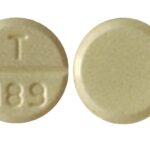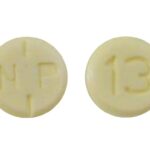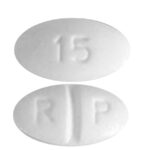What Is K 18 White Pill Used For?

The white, round pill with the imprint K 18 has been identified as Oxycodone Hydrochloride 5 mg. It is supplied by KVK Tech Inc.. Oxycodone 30 mg is classified as a Schedule 2 controlled substance under the Controlled Substance Act (CSA).
Oxycodone is similar to a group of natural substances in the brain called endorphins. These substances work to decrease the pain messages that your body sends to your brain. By mimicking these substances, oxycodone decreases the amount of pain your brain thinks you’re having.
What should I tell my health care provider before I take this medicine?
They need to know if you have any of these conditions:
• Addison’s disease
• brain tumor
• gallbladder disease
• head injury
• heart disease
• history of drug or alcohol abuse problem
• if you often drink alcohol
• kidney disease
• liver disease
• lung or breathing disease, like asthma
• mental illness
• pancreatic disease
• seizures
• stomach or intestine problems
• thyroid disease
• trouble swallowing
• an unusual or allergic reaction to oxycodone, codeine, hydrocodone, morphine, other medicines, foods, dyes, or preservatives
• pregnant or trying to get pregnant
• breast-feeding.
How should I take K 18 pill?
Take this medicine by mouth with a full glass of water. Follow the directions on the prescription label. Do not cut, crush or chew this medicine. Swallow only one tablet at a time. Do not wet, soak, or lick the tablet before you take it. You can take it with or without food. If it upsets your stomach, take it with food. Take your medicine at regular intervals. Do not take it more often than directed. Do not stop taking except on your doctor’s advice.
A special K 18 pill MedGuide will be given to you by the pharmacist with each prescription and refill. Be sure to read this information carefully each time.
Talk to your pediatrician regarding the use of this medicine in children. While this drug may be prescribed for children as young as 11 years for selected conditions, precautions do apply.
Overdosage: If you think you have taken too much of K 18 pill, contact a poison control center or emergency room at once.
NOTE: This medicine is only for you. Do not share this medicine with others.
What if I miss a dose?
If you miss a dose, take it as soon as you can. If it is almost time for your next dose, take only that dose. Do not take double or extra doses.
What may interact with K 18 pill?
This medicine may interact with the following medications:
• alcohol
• antihistamines for allergy, cough and cold
• antiviral medicines for HIV or AIDS
• atropine
• certain antibiotics like clarithromycin, erythromycin, linezolid, rifampin
• certain medicines for anxiety or sleep
• certain medicines for bladder problems like oxybutynin, tolterodine
• certain medicines for depression like amitriptyline, fluoxetine, sertraline
• certain medicines for fungal infections like ketoconazole, itraconazole, voriconazole
• certain medicines for migraine headache like almotriptan, eletriptan, frovatriptan, naratriptan, rizatriptan, sumatriptan, zolmitriptan
• certain medicines for nausea or vomiting like dolasetron, ondansetron, palonosetron
• certain medicines for Parkinson’s disease like benztropine, trihexyphenidyl
• certain medicines for seizures like phenobarbital, phenytoin, primidone
• certain medicines for stomach problems like dicyclomine, hyoscyamine
• certain medicines for travel sickness like scopolamine
• diuretics
• general anesthetics like halothane, isoflurane, methoxyflurane, propofol
• ipratropium
• local anesthetics like lidocaine, pramoxine, tetracaine
• MAOIs like Carbex, Eldepryl, Marplan, Nardil, and Parnate
• medicines that relax muscles for surgery
• methylene blue
• nilotinib
• other narcotic medicines for pain or cough
• phenothiazines like chlorpromazine, mesoridazine, prochlorperazine, and thioridazine.
This list may not describe all possible interactions. Give your healthcare provider a list of all the medicines, herbs, non-prescription drugs, or dietary supplements you use. Also, tell them if you smoke, drink alcohol, or use illegal drugs. Some items may interact with your medicine.
What should I watch for while using this medicine?
Tell your doctor or health care professional if your pain does not go away, if it gets worse, or if you have new or a different type of pain. You may develop tolerance to the medicine. Tolerance means that you will need a higher dose of the medication for pain relief. Tolerance is normal and is expected if you take this medicine for a long time.
Do not suddenly stop taking your medicine because you may develop a severe reaction. Your body becomes used to the medicine. This does NOT mean you are addicted. Addiction is a behavior related to getting and using a drug for a non-medical reason. If you have pain, you have a medical reason to take pain medicine. Your doctor will tell you how much medicine to take. If your doctor wants you to stop the medicine, the dose will be slowly lowered over time to avoid any side effects.
There are different types of narcotic medicines (opiates). If you take more than one type at the same time or if you are taking another medicine that also causes drowsiness, you may have more side effects. Give your health care provider a list of all medicines you use. Your doctor will tell you how much medicine to take. Do not take more medicine than directed. Call emergency for help if you have problems breathing or unusual sleepiness.
You may get drowsy or dizzy. Do not drive, use machinery, or do anything that needs mental alertness until you know how the medicine affects you. Do not stand or sit up quickly, especially if you are an older patient. This reduces the risk of dizzy or fainting spells. Alcohol may interfere with the effect of this medicine. Avoid alcoholic drinks.
This medicine will cause constipation. Try to have a bowel movement at least every 2 to 3 days. If you do not have a bowel movement for 3 days, call your doctor or health care professional.
Your mouth may get dry. Chewing sugarless gum or sucking hard candy, and drinking plenty of water may help. Contact your doctor if the problem does not go away or is severe.
The tablet shell for some brands of this medicine does not dissolve. This is normal. The tablet shell may appear whole in the stool. This is not a cause for concern.
What are the side effects of K 18 pill?
Side effects that you should report to your doctor or health care professional as soon as possible:
• allergic reactions like skin rash, itching or hives, swelling of the face, lips, or tongue
• breathing problems
• confusion
• signs and symptoms of low blood pressure like dizziness; feeling faint or lightheaded, falls; unusually weak or tired
• trouble passing urine or change in the amount of urine
• trouble swallowing
Side effects that usually do not require medical attention (report to your doctor or health care professional if they continue or are bothersome):
• constipation
• dry mouth
• nausea, vomiting
• tiredness
This list may not describe all possible side effects. Call your doctor for medical advice about side effects. You may report side effects to FDA at 1-800-FDA-1088.
Where should I keep my medicine?
Keep out of the reach of children. This medicine can be abused. Keep your medicine in a safe place to protect it from theft. Do not share this medicine with anyone. Selling or giving away this medicine is dangerous and against the law.
Store at room temperature between 15 and 30 degrees C (59 and 86 degrees F). Protect from light. Keep container tightly closed.
This medicine may cause harm and death if it is taken by other adults, children, or pets. Return medicine that has not been used to an official disposal site. Contact the DEA at 1-800-882-9539 or your city/county government to find a site. If you cannot return the medicine, flush it down the toilet. Do not use the medicine after the expiration date.





